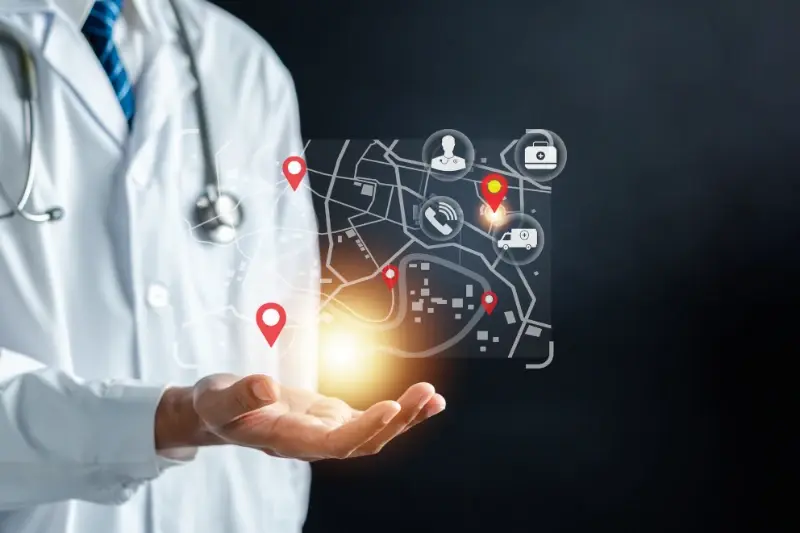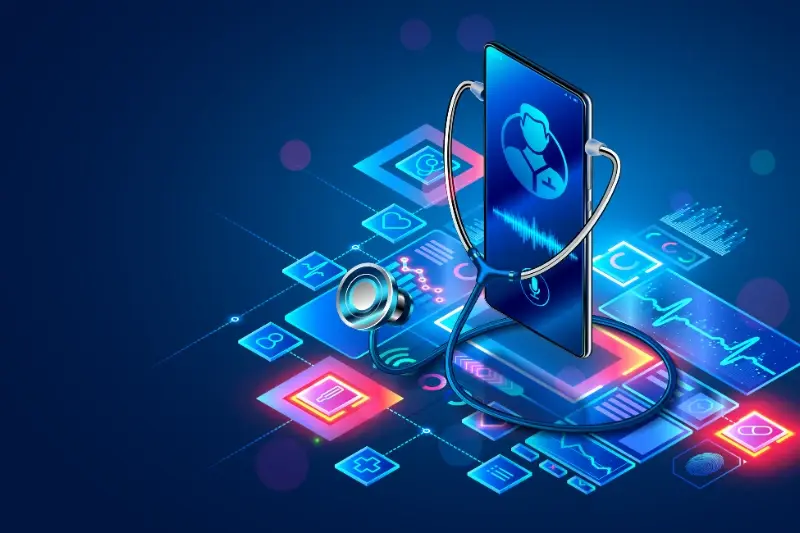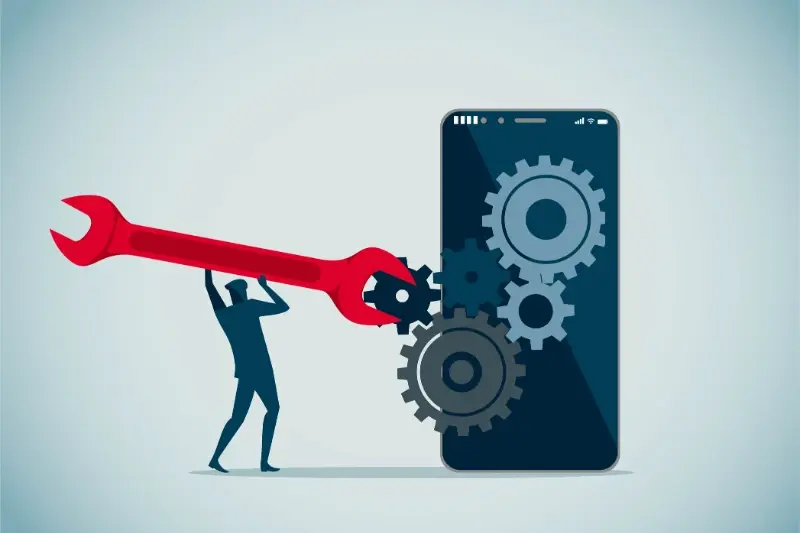Mobile Health App Development: Navigating the Clinical-Technical Divide
The journey of mobile health app development often begins with a simple yet powerful idea: making healthcare more accessible, efficient, and patient-friendly. As medical professionals and technology innovators increasingly look to bridge the gap between clinical care and digital solutions, the need for robust mHealth development has never been more apparent.
Healthcare innovation isn't just about creating new technology - it's about understanding the delicate balance between clinical excellence and digital accessibility whilst ensuring patient safety remains paramount.
In the UK's rapidly evolving healthcare landscape, we've witnessed how medical app creation has transformed everything from GP appointments to chronic disease management. The NHS App, for instance, now serves millions of Britons, demonstrating the tremendous potential of well-designed healthcare apps.
However, developing clinical apps requires more than just technical expertise. It demands a deep understanding of healthcare app features, stringent regulatory compliance, and the ability to navigate complex medical protocols. For healthcare providers and technology companies alike, this means carefully balancing clinical requirements with technical capabilities.
As specialists in health tech development, we've observed that successful medical applications share common threads: they prioritise patient safety, maintain strict data protection standards, and seamlessly integrate with existing healthcare systems. Whether you're a healthcare provider looking to digitalise services or a startup with an innovative medical solution, understanding these fundamentals is crucial.
In this comprehensive guide, we'll explore the intricate world of medical app development, from meeting clinical app requirements to ensuring compliance with UK healthcare regulations. Let's begin this journey by understanding the essential building blocks of successful mHealth solutions.
Healthcare Regulations and Standards in the UK
Developing healthcare apps for the UK market requires careful navigation through a complex web of regulations and standards. At the heart of these requirements sits the NHS Digital Standards Framework, which ensures all digital health solutions maintain the highest levels of safety and reliability.
Essential Regulatory Requirements
The UK's healthcare app landscape is governed by several key regulations. The Medical Device Regulations (UK MDR) classifies health apps based on their risk levels and intended use. For instance, a simple meditation app might face lighter scrutiny than one designed for diabetes management. GDPR and the UK Data Protection Act 2018 are particularly crucial, as they govern how patient data must be handled - something we've seen become increasingly important with the rise of remote healthcare services.
NHS Digital Standards and Compliance
The NHS Digital Technology Assessment Criteria (DTAC) serves as a comprehensive framework for healthcare apps. It's rather like getting a MOT for your car - every component needs to meet specific standards. This includes everything from clinical safety (DCB 0129 and DCB 0160) to accessibility requirements and interoperability standards.
We've observed that successful UK health tech companies, like Babylon Health and Push Doctor, have thrived by embracing these regulations rather than seeing them as obstacles. British patients tend to place enormous trust in NHS-approved digital solutions, making compliance not just a legal requirement but a valuable trust signal.
The key is understanding that these regulations aren't just red tape - they're essential safeguards that protect patients and healthcare providers alike. When implemented correctly, they create a foundation for innovation while maintaining the high standards that British healthcare is known for.
Key Features and Security Requirements for Medical Apps
When developing medical apps, striking the right balance between functionality and security isn't just good practice—it's essential for patient safety and regulatory compliance. As we've seen countless times in our mHealth development projects, successful healthcare apps need to prioritise both clinical utility and data protection.
Essential Features for Medical Apps
- Secure patient data storage and transmission
- Multi-factor authentication
- Role-based access control
- Emergency access protocols
- Audit trails and activity logging
- Integration with NHS systems
Healthcare app features must align with NHS Digital standards whilst meeting the practical needs of both clinicians and patients. Take the NHS App, for instance—its success stems from combining robust security measures with user-friendly features like appointment booking and prescription management.
Security Requirements and Compliance
Medical app creation requires strict adherence to UK data protection laws. Beyond basic GDPR compliance, health tech development must incorporate NHS-specific security protocols, including end-to-end encryption and secure API integration. Remember, we're handling some of the most sensitive personal data possible—every security measure counts.
When implementing security features, always test with actual healthcare professionals. Their real-world insights often reveal practical security considerations that technical specifications might miss.
Clinical app requirements go beyond just ticking boxes for compliance. They must seamlessly integrate into existing healthcare workflows whilst maintaining the highest security standards. This means incorporating features like automated timeouts, secure messaging systems, and robust backup procedures—all whilst ensuring the app remains intuitive and efficient for daily use.
Bridging Clinical Knowledge and Technical Development
Creating successful healthcare apps requires a delicate balance between clinical expertise and technical innovation. It's rather like building a bridge between two distinct worlds - each with its own language, priorities, and ways of thinking.
The Communication Challenge
At Glance, we've learned that effective healthcare app development hinges on meaningful collaboration between medical professionals and developers. Think of it as translating between two different languages - medical terminology on one side and programming code on the other.
We've found that the most successful projects employ a structured approach to bridge this divide. Here's what we've learned works best:
- Regular workshops bringing together clinicians and developers
- Clinical advisory boards to guide technical decisions
- Dedicated 'translators' who understand both healthcare and technology
- Iterative prototyping with continuous clinical feedback
- Documentation that's accessible to both technical and medical teams
Creating Shared Understanding
One particularly effective approach we've adopted is the creation of detailed user stories that incorporate both clinical and technical requirements. For instance, when developing a diabetes management app, we ensure that blood glucose monitoring features align with both NHS clinical guidelines and technical feasibility.
Remember the NHS's failed IT programme in the early 2000s? It's a perfect example of what happens when clinical and technical teams work in isolation. Today, successful UK health tech companies like Babylon Health and Push Doctor demonstrate the power of getting this collaboration right, creating solutions that truly serve both healthcare providers and patients.
The key is maintaining constant dialogue between all stakeholders while keeping the patient's needs at the heart of every decision.
Challenges and Solutions in mHealth Development
Developing healthcare apps isn't quite like building the next social media platform or fitness tracker. As we've learned through countless projects, mHealth development comes with its own unique set of hurdles that require careful navigation.
Common Development Challenges
One of the biggest challenges we encounter in medical app creation is maintaining the delicate balance between user-friendly interfaces and complex clinical requirements. It's rather like trying to explain brain surgery using a children's picture book - the information needs to be accurate yet accessible.
The true art of healthcare app development lies not in writing perfect code, but in translating medical complexity into digital simplicity whilst maintaining clinical integrity
Practical Solutions and Approaches
When tackling health tech development challenges, we've found that early collaboration between clinical experts and developers is absolutely crucial. Think of it as having a GP and a programmer sharing a cup of tea while sketching out ideas - it's this kind of cooperative approach that yields the best results.
Security requirements for medical apps present another significant challenge. With NHS Digital standards and GDPR regulations to consider, we implement multiple layers of protection - much like an onion, with each layer adding extra security. We've learned that using standardised APIs and following NHS-approved frameworks helps streamline this process considerably.
Clinical app requirements often evolve during development, especially when working with NHS trusts. The solution? Agile methodology with regular stakeholder check-ins. It's similar to having regular check-ups with your doctor - catching potential issues early makes them much easier to address.
The Future of Digital Healthcare in Britain
Britain's healthcare landscape is undergoing a remarkable digital transformation, and we're witnessing this evolution firsthand through our work with NHS trusts and private healthcare providers. The future of digital healthcare in the UK is shaping up to be more connected, patient-centric, and technologically sophisticated than ever before.
Integration and Interoperability
The NHS's commitment to digital transformation is creating exciting opportunities for healthcare providers and patients alike. We're seeing a strong push towards unified health records and seamless data sharing between different NHS trusts, all while maintaining strict GDPR compliance. Just as we can now easily share photos with family members across different devices, future healthcare systems will allow secure information sharing between GPs, specialists, and emergency services.
Patient Empowerment Through Technology
British patients are increasingly taking control of their health through digital solutions. From virtual GP consultations to wearable devices that monitor vital signs, we're moving towards a healthcare system where prevention is as important as treatment. Remember how online banking transformed our relationship with financial services? Healthcare is following a similar trajectory.
The NHS App's success story, with millions of active users managing their health records, booking appointments, and ordering prescriptions, is just the beginning. We're seeing increased adoption of AI-driven diagnostics, remote monitoring solutions, and personalised healthcare apps that comply with NHS Digital standards.
For healthcare providers and developers alike, this digital future presents both opportunities and responsibilities. As we continue to bridge the gap between clinical needs and technical solutions, our focus remains on creating secure, accessible, and user-friendly digital health tools that truly serve British patients while maintaining the high standards of our healthcare system.
Conclusion
As we've explored throughout this guide, mobile health app development sits at a fascinating intersection of clinical expertise and technical innovation. The journey of creating successful mHealth solutions requires careful navigation of the UK's robust healthcare standards, particularly those set by the NHS Digital framework, whilst delivering intuitive and secure solutions that truly serve patients and practitioners alike.
From our experience in healthcare app development, we've seen firsthand how the landscape continues to evolve. The challenges of meeting clinical app requirements whilst maintaining technical excellence are significant, but certainly not insurmountable. The key lies in fostering strong collaboration between healthcare professionals and development teams, ensuring that medical app creation follows both best practices and regulatory guidelines.
For those embarking on health tech development projects, remember that success comes from putting patient needs and safety first. Whether you're creating a simple wellness tracker or a complex clinical management system, maintaining compliance with GDPR and NHS standards isn't just a regulatory requirement – it's an essential foundation for building trust with your users.
The future of digital healthcare in Britain looks incredibly promising, with innovative mHealth solutions continuing to transform patient care. As technology advances and regulations mature, we'll likely see even more sophisticated and integrated healthcare applications emerging. The key to success will always be maintaining that delicate balance between clinical accuracy, technical excellence, and user-friendly design.
By understanding and embracing these principles, developers and healthcare professionals can work together to create meaningful solutions that genuinely improve patient outcomes and advance the quality of healthcare delivery across the UK.
Share this
Subscribe To Our Blog
You May Also Like
These Related Stories

From Idea To Patient Care: The Complete Healthcare App Journey

Key Patient Engagement Features for Your Healthcare Mobile App Development





